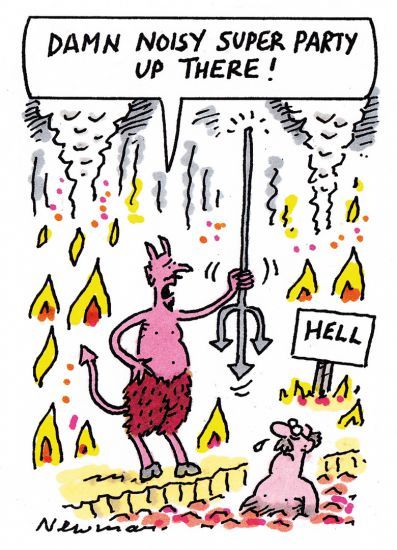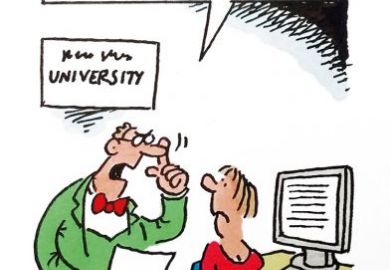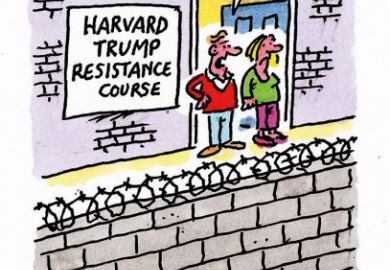
Ann Coulter, the US conservative political commentator and writer, pulled out of a speech that she was due to make at the University of California, Berkeley last week after police were unable to guarantee her (and attendees’) safety, Inside Higher Ed reported. Despite the cancellation, Berkeley was still anticipating unrest of the sort witnessed in February, when ex-Breitbart editor Milo Yiannopoulos was due to speak (an event ultimately cancelled on safety grounds). On that occasion, protesters lit fires and destroyed campus property. The university will be delighted, therefore, to read in The Washington Post that Mr Yiannopoulos is planning to occupy the public plaza at the Berkeley campus to host a week of “free-speech rallies” this autumn.
Malia Bouattia sent a political earthquake through the UK’s National Union of Students when she beat Megan Dunn to the national presidency 12 months ago. Last week, however, it was Ms Bouattia’s turn to be deposed when her bid for a second term was overwhelmingly defeated at the union’s national conference by Shakira Martin, currently the vice-president (further education). The vote marks a shift back towards the political centre for the union, after a year of ongoing political division under Ms Bouattia, who faced continued criticism for making comments that were allegedly anti-Semitic – something that she denied. After securing 402 votes to Ms Bouattia’s 272, with Durham University politics student Tom Harwood getting 35, Ms Martin said that she wanted to lead a union focused on its members, not its leader. She will take on the top job this summer.
Think of student parties and images of cheap lager, Lambrini, bad DJ’ing and pizza boxes may well spring to mind. If so, then you are living in the past, according to Newcastle City Council, which has been warning students about the dangers of a new breed of “super parties”: all-night house parties that cater to hundreds of revellers, often staffed by bouncers and requiring tickets. It may sound fun, but as The Guardian reported on 26 April, many student dwellings simply aren’t built to handle the footfall and floors could collapse. “Alcohol, drugs, loud music and hundreds of partygoers is a recipe for disaster,” said Northumbria Police chief superintendent Neil Hutchison, after unconvincingly declaring “we don’t want to be seen as the fun police”.
A UK university has rejected calls to remove books by the Holocaust denier David Irving from its library. The Guardian reported on 28 April that Rowan Williams, the former archbishop of Canterbury, had joined the campaign to have works by the controversial historian removed from open display at the University of Manchester. It comes after the archbishop, who is now master of Magdalene College, Cambridge, wrote to universities minister Jo Johnson comparing Mr Irving’s books to jihadi material, suggesting that they should be clearly labelled and available only on request. However, Manchester said that it had consulted its Centre for Jewish Studies on its decision to keep the books on display. “The university is committed to allowing our students to have access to challenging and controversial works on many different subjects in order to pursue their studies,” a statement said. “This approach in no way compromises the university’s fundamental rejection of discrimination, which is at the heart of how we seek to educate students and pursue our research activities."
It is probably impossible to go seven days now without a UK national newspaper having a “‘Generation Snowflake’ cannot deal with free speech on campus and requires a safe space” story. The University of Oxford was the latest to cop it with The Daily Telegraph reporting on 22 April how students had been advised to be wary of examples of “everyday racism” such as “not speaking directly to people” with a different ethnic background or asking them where they are “originally” from. Given the privileged background of some of Oxford’s students, the advice did not sound like it was completely unwarranted, but it was seized on as another example of the thought police taking over higher education. What would be really helpful is if somebody could create a safe space where it is guaranteed that you won’t ever encounter a higher education political correctness story, but unfortunately that may require a time machine.
Register to continue
Why register?
- Registration is free and only takes a moment
- Once registered, you can read 3 articles a month
- Sign up for our newsletter
Subscribe
Or subscribe for unlimited access to:
- Unlimited access to news, views, insights & reviews
- Digital editions
- Digital access to THE’s university and college rankings analysis
Already registered or a current subscriber?


